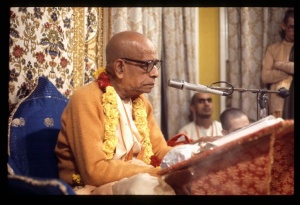SB 10.82.2: Difference between revisions
m (1 revision(s)) |
No edit summary |
||
| Line 1: | Line 1: | ||
{{info | {{info | ||
|speaker= | |speaker=Śukadeva Gosvāmī | ||
|listener= | |listener=King Parīkṣit | ||
}} | }} | ||
[[Category:Srimad-Bhagavatam - Canto 10 Chapter 82|s02]] | |||
[[Category:Bhagavatam Verses Spoken by Sukadeva Gosvami - Vanisource|108202]] | |||
<div style="float:left">'''[[Srimad-Bhagavatam]] - [[SB 10|Tenth Canto]] - [[SB 10.82: Krsna and Balarama Meet the Inhabitants of Vrndavana|Chapter 82: Kṛṣṇa and Balarāma Meet the Inhabitants of Vṛndāvana]]'''</div> | |||
<div style="float:right">[[File:Go-previous.png|link=SB 10.82.1]] '''[[SB 10.82.1]] - [[SB 10.82.3-6]]''' [[File:Go-next.png|link=SB 10.82.3-6]]</div> | |||
{{RandomImage}} | |||
{{SBnotice}} | |||
==== TEXT 2 ==== | ==== TEXT 2 ==== | ||
<div | <div class="verse"> | ||
taṁ jñātvā manujā rājan | :taṁ jñātvā manujā rājan | ||
purastād eva sarvataḥ | :purastād eva sarvataḥ | ||
samanta-pañcakaṁ kṣetraṁ | :samanta-pañcakaṁ kṣetraṁ | ||
yayuḥ śreyo-vidhitsayā | :yayuḥ śreyo-vidhitsayā | ||
</div> | </div> | ||
| Line 17: | Line 22: | ||
==== SYNONYMS ==== | ==== SYNONYMS ==== | ||
<div | <div class="synonyms"> | ||
''tam''—that; ''jñātvā''—knowing; ''manujāḥ''—people; ''rājan''—O King (Parīkṣit); ''purastāt''—beforehand; ''eva''—even; ''sarvataḥ''—from everywhere; ''samanta-pañcakam''—named Samanta-pañcaka (within the sacred district of Kurukṣetra); ''kṣetram''—to the field; ''yayuḥ''—went; ''śreyaḥ''—benefit; ''vidhitsayā''—wishing to create. | |||
</div> | </div> | ||
{{SBcollapse}} | |||
==== TRANSLATION ==== | ==== TRANSLATION ==== | ||
<div | <div class="translation"> | ||
Knowing of this eclipse in advance, O King, many people went to the holy place known as Samanta-pañcaka in order to earn pious credit. | Knowing of this eclipse in advance, O King, many people went to the holy place known as Samanta-pañcaka in order to earn pious credit. | ||
</div> | </div> | ||
| Line 31: | Line 36: | ||
==== PURPORT ==== | ==== PURPORT ==== | ||
<div | <div class="purport"> | ||
Vedic astronomers of five thousand years ago could predict eclipses of the sun and moon just as well as our modern astronomers can. The knowledge of the ancient astronomers went much further, however, since they understood the karmic influences of such events. Solar and lunar eclipses are generally very inauspicious, with certain rare exceptions. But just as the otherwise inauspicious Ekādaśī day becomes beneficial when used for the glorification of Lord Hari, so the time of an eclipse is also advantageous for fasting and worship. | Vedic astronomers of five thousand years ago could predict eclipses of the sun and moon just as well as our modern astronomers can. The knowledge of the ancient astronomers went much further, however, since they understood the karmic influences of such events. Solar and lunar eclipses are generally very inauspicious, with certain rare exceptions. But just as the otherwise inauspicious Ekādaśī day becomes beneficial when used for the glorification of Lord Hari, so the time of an eclipse is also advantageous for fasting and worship. | ||
The holy pilgrimage site known as Samanta-pañcaka is located at Kurukṣetra, the "sacred ground of the Kurus," where the Kuru kings' predecessors performed many Vedic sacrifices. The Kurus were thus advised by learned brāhmaṇas that this would be the best place for them to observe vows during the eclipse. Long before their time, Lord Paraśurāma had done penance at Kurukṣetra to atone for his killings. Samanta-pañcaka, the five ponds he dug there, were still present at the end of Dvāpara-yuga, as they are even today. | The holy pilgrimage site known as Samanta-pañcaka is located at Kurukṣetra, the "sacred ground of the Kurus," where the Kuru kings' predecessors performed many Vedic sacrifices. The Kurus were thus advised by learned ''brāhmaṇas'' that this would be the best place for them to observe vows during the eclipse. Long before their time, Lord Paraśurāma had done penance at Kurukṣetra to atone for his killings. Samanta-pañcaka, the five ponds he dug there, were still present at the end of Dvāpara-yuga, as they are even today. | ||
</div> | </div> | ||
__NOTOC__ | </div> | ||
</div> | |||
<div style="float:right">[[File:Go-previous.png|link=SB 10.82.1]] '''[[SB 10.82.1]] - [[SB 10.82.3-6]]''' [[File:Go-next.png|link=SB 10.82.3-6]]</div> | |||
__NOTOC__ | |||
__NOEDITSECTION__ | |||
Revision as of 12:22, 11 June 2021

A.C. Bhaktivedanta Swami Prabhupada
Please note: The synonyms, translation and purport of this verse were composed by disciples of Śrīla Prabhupāda
TEXT 2
- taṁ jñātvā manujā rājan
- purastād eva sarvataḥ
- samanta-pañcakaṁ kṣetraṁ
- yayuḥ śreyo-vidhitsayā
SYNONYMS
tam—that; jñātvā—knowing; manujāḥ—people; rājan—O King (Parīkṣit); purastāt—beforehand; eva—even; sarvataḥ—from everywhere; samanta-pañcakam—named Samanta-pañcaka (within the sacred district of Kurukṣetra); kṣetram—to the field; yayuḥ—went; śreyaḥ—benefit; vidhitsayā—wishing to create.
Translation and purport composed by disciples of Śrīla Prabhupāda
TRANSLATION
Knowing of this eclipse in advance, O King, many people went to the holy place known as Samanta-pañcaka in order to earn pious credit.
PURPORT
Vedic astronomers of five thousand years ago could predict eclipses of the sun and moon just as well as our modern astronomers can. The knowledge of the ancient astronomers went much further, however, since they understood the karmic influences of such events. Solar and lunar eclipses are generally very inauspicious, with certain rare exceptions. But just as the otherwise inauspicious Ekādaśī day becomes beneficial when used for the glorification of Lord Hari, so the time of an eclipse is also advantageous for fasting and worship.
The holy pilgrimage site known as Samanta-pañcaka is located at Kurukṣetra, the "sacred ground of the Kurus," where the Kuru kings' predecessors performed many Vedic sacrifices. The Kurus were thus advised by learned brāhmaṇas that this would be the best place for them to observe vows during the eclipse. Long before their time, Lord Paraśurāma had done penance at Kurukṣetra to atone for his killings. Samanta-pañcaka, the five ponds he dug there, were still present at the end of Dvāpara-yuga, as they are even today.